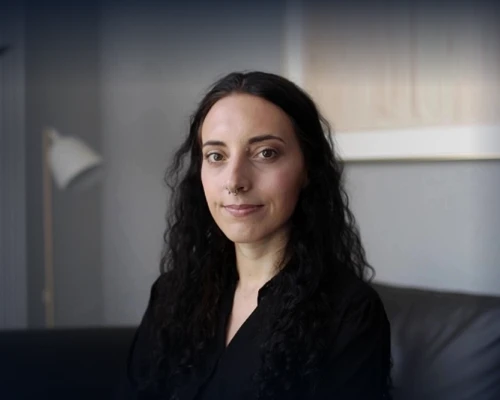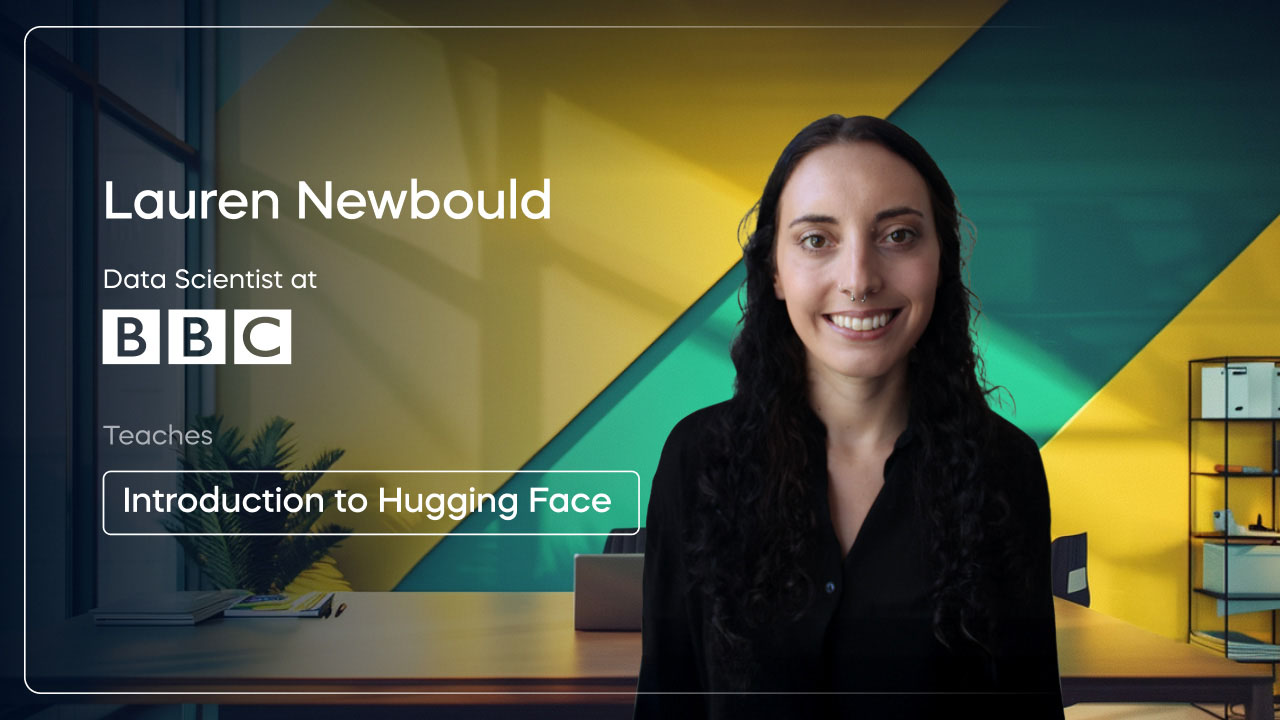Introduction to Hugging Face
Master working with state-of-the art Large Lanaguage Models with Hugging Face’s powerful tools and libraries.
 Start for Free
Start for Free
What you get:
- 2 hours of content
- 16 Interactive exercises
- 3 Downloadable resources
- World-class instructor
- Closed captions
- Q&A support
- Future course updates
- Course exam
- Certificate of achievement
Introduction to Hugging Face
 Start for Free
Start for Free
What you get:
- 2 hours of content
- 16 Interactive exercises
- 3 Downloadable resources
- World-class instructor
- Closed captions
- Q&A support
- Future course updates
- Course exam
- Certificate of achievement
$99.00
Lifetime access
 Start for Free
Start for Free
What you get:
- 2 hours of content
- 16 Interactive exercises
- 3 Downloadable resources
- World-class instructor
- Closed captions
- Q&A support
- Future course updates
- Course exam
- Certificate of achievement

What You Learn
- An overview of the Hugging Face suite of tools
- Easily impliment models for a range of NLP tasks using pipelines
- Find datasets for model training through the Datasets Hub
- Using the datasets library to load and transform data
- Load and work with cutting-edge models using the Transformers library
- Fine-tune models using your own data and tasks
- Loading, storing and sharing models through the Models Hub
- Create a Gradio app for your model and share with Spaces
- Integrating Hugging Face with Pytorch and Tensorflow
- Using Hugging Face for text, audio and image-based tasks
Top Choice of Leading Companies Worldwide
Industry leaders and professionals globally rely on this top-rated course to enhance their skills.
Course Description
Hugging Face is an essential toolkit for any developer working with state-of-the-art Large Language Models (LLMs). This course will introduce you to the powerful tools and libraries Hugging Face offers, from out-of-the-box solutions, to custom model training and configurations.
Through engaging text and video lessons, interactive excersises and coding tutorials, you'll gain the practical skills needed to work confidently with Hugging Face.
The course is structures into several chapters, each building on the last, focusing on key aspects of the Hugging Face ecosystem. Throughout each chapter we’ll be looking at specific tools and code that can help us achieve our goals and improve your skills.
Let's take a look at the course chapters in more detail:
- Introduction to Hugging Face
To get started, we'll be covering exactly what Hugging Face is and all the kinds of projects it can be used for. This will give you a firm understanding of the tools available before we get stuck in with some hands-on practicals. - Getting Started With Pipelines
Pipelines allow us to work with state-of-the art models in just a few lines of code! We'll be working through some practical examples of how we can create simple pipelines using LLMs for a range of Natural Language Processing tasks. - Hugging Face Models
There are a whole range of models available to us through Hugging Face. Here I'll introduce you to the Models Hub, a fantastic tool for sourcing high quality models to work with. I show you how we can load different LLMs for use in our projects. - Hugging Face Tokenizers
In this section of the course I'll show you a number of different ways we can preprocess text data, preparing us for some more advanced topics when working with transformer models. - Fine-Tuning Models
We will work through an in-depth case study as I walk you through an example of how to fine-tune an LLM for a specific language task. We'll also be sharing our models using Hugging Face Spaces and Gradio! - Advancing Your Knowledge
Here I will introduce you to some of the more advanced topics of working with Hugging Face such as working with large data, managing hardware configurations and integrating with other frameworks. - Beyond Text: Audio and Video
The Hugging Face suite of tools makes it easy to work with transformer models across a whole range of tasks. This section of the course will the skills we have developed in earlier chapters, and adapt to work with audio and image-based data.
If you're looking to develop your skills working with Large Language Models, or AI models in general, then this course is for you. I will provide you with the knowledge and practical skills needed to become a master through Hugging Face!
Learn for Free

1.1 Course Introduction
4 min

1.2 Setting up Your Environment
4 min

2.1 What is Hugging Face?
5 min
Curriculum
Topics
Course Requirements
- Good understanding of Python
- Familiarity with Natural Language Processing
- Familiarity with Large Language Models
Who Should Take This Course?
Level of difficulty: Advanced
- Aspiring data scientists, ML engineers, and AI developers
- Existing data scientists, ML engineers, and AI developers who want to improve their technical skills
Exams and Certification
A 365 Data Science Course Certificate is an excellent addition to your LinkedIn profile—demonstrating your expertise and willingness to go the extra mile to accomplish your goals.

Meet Your Instructor

Guided by a comprehensive social science and statistics background, Lauren's data science career has taken her through several pivotal roles—from creating custom NLP solutions for non-profits in Nepal to providing insights for BBC Sport and the 2020 Olympics. Lauren has spoken at several conferences on how NLP can benefit those in developing countries and advocates for ethical and open data science. She aims to empower individuals and organizations to make confident, data-driven decisions and to ensure AI is fair and accessible for all.
What Our Learners Say
365 Data Science Is Featured at
Our top-rated courses are trusted by business worldwide.